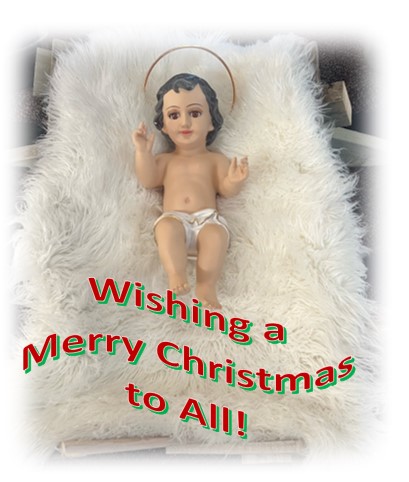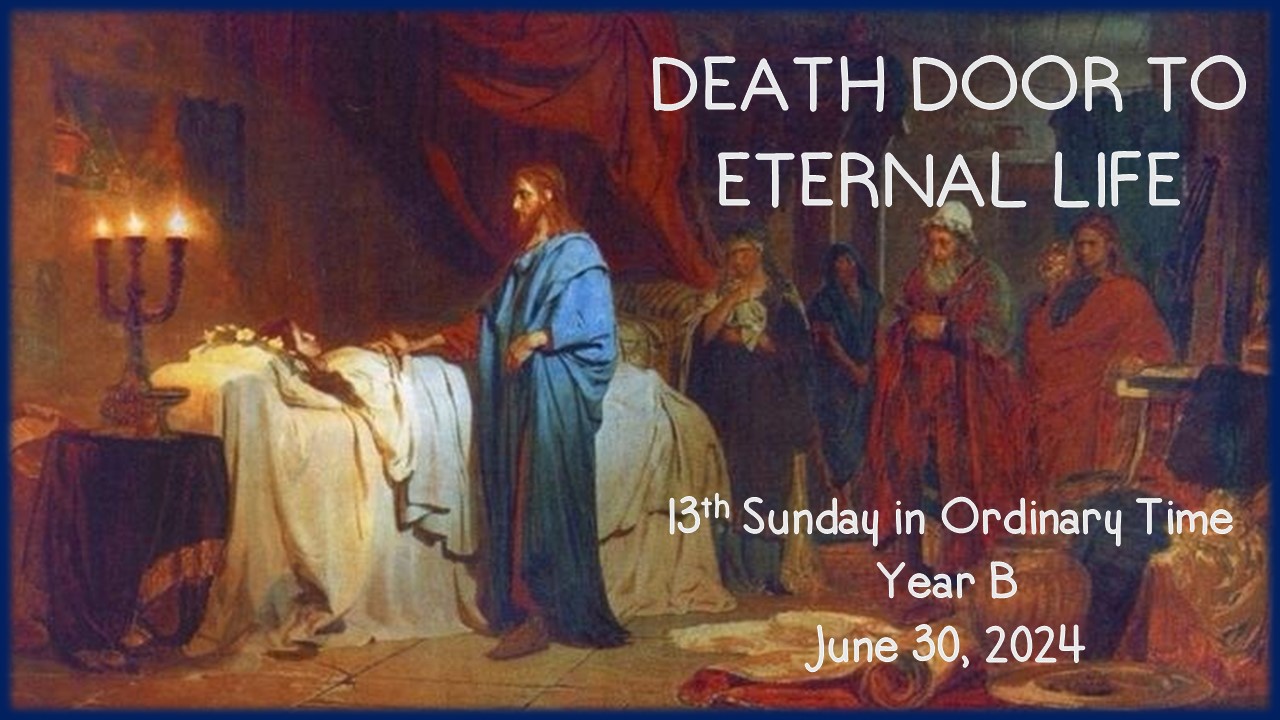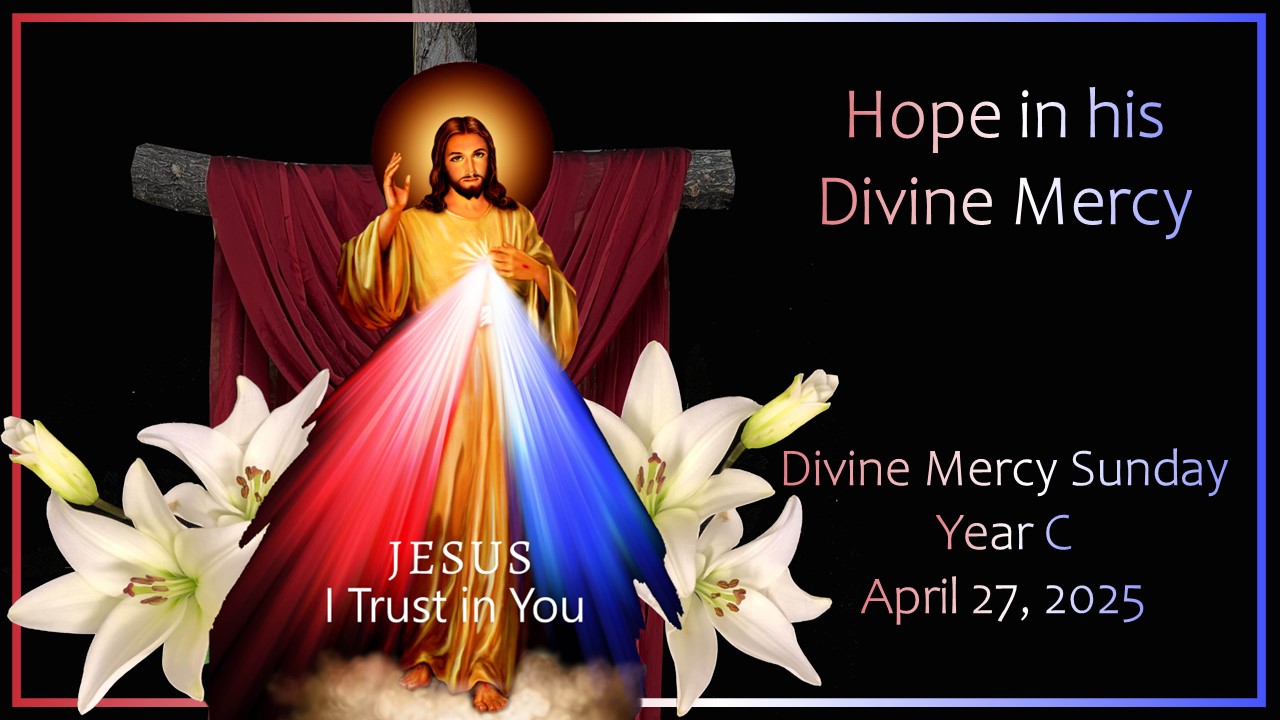
The Nativity of the Lord ~ Year A ~ December 25, 2022
HE DWELT AMONG US
Prophet Isaiah opens us our hearts to reflect on the mystery of God becoming man and dwelling among us “Behold a virgin is with a Child and she will name him Emmanuel which means God is with us”. He, being Emmanuel walks with us and shares our humanity. St. Bernard rightly reflects on this mystery this way as he believes that conceiving of Jesus, Blessed Virgin Mary has made the path clear for us to understand that he dwells among us and walks with us. “You have heard, O Virgin, that you will conceive and bear a son; you have heard that it will not be by man but by the Holy Spirit. The angel awaits an answer; it is time for him to return to God who sent him. We too are waiting, O Lady, for your word of compassion; the sentence of condemnation weighs heavily upon us. The price of our salvation is offered to you. We shall be set free at once if you consent. In the eternal Word of God we all came to be, and behold, we die. In your brief response we are to be remade in order to be recalled to life. Tearful Adam with his sorrowing family begs this of you, O loving Virgin, in their exile from Paradise. Abraham begs it, David begs it. All the other holy patriarchs, your ancestors, ask it of you, as they dwell in the country of the shadow of death. This is what the whole earth waits for, prostrate at your feet. It is right in doing so, for on your word depends, comfort for the wretched, ransom for the captive, freedom for the condemned, indeed, salvation for all the sons of Adam, the whole of your race. Answer quickly, O Virgin. Reply in haste to the angel, or rather through the angel to the Lord. Answer with a word, receive the Word of God. Speak your own word, conceive the divine Word. Breathe a passing word, embrace the eternal Word.
Why do you delay, why are you afraid? Believe, give praise, and receive. Let humility be bold, let modesty be confident. This is no time for virginal simplicity to forget prudence. In this matter alone, O prudent Virgin, do not fear to be presumptuous. Though modest silence is pleasing, dutiful speech is now more necessary. Open your heart to faith, O blessed Virgin, your lips to praise, your womb to the Creator. See, the desired of all nations is at your door, knocking to enter. If he should pass by because of your delay, in sorrow you would begin to seek him afresh, the One whom your soul loves. Arise, hasten, open. Arise in faith, hasten in devotion, open in praise and thanksgiving. Behold the handmaid of the Lord, she says, be it done to me according to your word”.
This mystery of God’s taking flesh and dwelling among us leads to us reflect on the title of Jesus found in O Antiphons as mentioned in the last week’s reflection. Those seven titles of Jesus in fact sum up the whole mystery of the Lord’s Nativity and his dwelling among us. Let me share them again.
O Wisdom of our God Most High, guiding creation with power and love: come to teach us the path of knowledge! The Old Testament teaches Wisdom as the eldest daughter of creation, but also as a co-creator with God. Many of the OT references are commonly (and easily,) applied to the Holy Spirit, but this antiphon clearly applies to Jesus. Prophet Isaiah had prophesied, the spirit of the Lord shall rest upon him: a spirit of wisdom and of understanding, a spirit of counsel and of strength, a spirit of knowledge and fear of the Lord, and his delight shall be the fear of the Lord. (11:2-3), and Wonderful is His counsel and great is His wisdom. (28:29). Wisdom is here personified, present with God at the beginning of creation. This is a pre-figurement of Jesus, the eternal Word of God, the “logos” John described in the opening of his gospel. Wisdom is the foundation of fear of the Lord, of holiness, or right living: it is wisdom whom we bid to come and teach us prudence. The cry “Come” will be repeated again and again, insistent and hope filled. His might is gentle, not harsh, He is forceful and holds a creator’s power, but sweetly, bearing these two traits, not in contrast, but in perfect, divine complement.
O Leader (Lord) of the House of Israel, giver of the Law to Moses on Sinai: come to rescue us with your mighty power! With this second antiphon we progress from creation to the familiar story of God manifesting himself by name to Moses and giving his law to Israel as their way of life. We are also reminded of the Israelites’ deliverance from bondage under pharaoh a foreshadowing of our own redemption from sin. The image of God’s arm outstretched in power to save his chosen people also brings to mind the later scene of Jesus with his arms outstretched for us on the cross.
O Flower of Jesse’s stem, sign of God’s love for all his people: come to save us without delay! Isaiah prophesied a restoration of David’s throne a new branch budding out of the old root. Christ is the root of Jesse in a two-fold sense: he is the descendant of David, who was the youngest son of Jesse, and he inherited the royal throne. The angel foretold to Mary, “The Lord God will give him the throne of David his father. He will rule over the house of Jacob forever and his reign will be without end” (Luke 1:32-33). Our hearts more and more urgently cry out for God’s reign to extend over all humanity: “Come, save us, and do not delay”.
O Key of David, opening the gates of God’s eternal Kingdom: come and free the prisoners of darkness! Isaiah had prophesied, God will place the Key of the House of David on His shoulder; when he opens, no one will shut, when he shuts, no one will open. And His dominion is vast and forever peaceful, from David’s throne, and over His kingdom, which he confirms and sustains by judgment and justice, both now and forever. The key and scepter are traditional symbols of kingly power and authority. Christ, the anointed one, is the heir of David and possessor of the kingdom. Jesus himself also made use of this symbol, showing the prophetic relationship of the earthly kingdom of David to the kingdom of God. All power and authority were given to him after the resurrection, and he entrusted this power to “bind and to loose” to Peter and the ministers of his church.
O Radiant Dawn, splendor of eternal light, sun of justice: come and shine on those who dwell in darkness and in the shadow of death. This title is variously translated “morning star”, “Dayspring”, “rising sun”, “radiant dawn”, “orient”. All beautifully express the idea of light shattering the darkness of night, of sin and death, of sickness and despair, with its brightness bringing healing and warmth to cold hearts. Jesus is indeed the true light, the radiance of his Father’s splendor. The church prays this petition daily in the Benedictus, joining in the words of Zechariah: “He, the Dayspring, shall visit us in his mercy to shine on those who sit in darkness and in the shadow of death” (Luke 1:78-79).
O King of all nations and keystone of the Church: come and save man, whom you formed from the dust! The earlier antiphons have already alluded to the Messiah coming not only to Israel but to convert the gentile nations and redeem them for his own. Now this sixth antiphon clearly addresses the savior as the king of the gentiles (Jer.10:7) and the Desired One of the nations. The Messiah is the cornerstone on whom our spiritual foundations are laid, but on whom unbelievers stumble (Matt. 21:42). This cornerstone unites and binds Jew and gentile into one, making peace between them. The plea is that God save all humanity, all his creation that he formed from the dust of the earth (Gen.2:7). We yearn for him once again to breathe the breath of his new life into us.
O Emmanuel, our King and Giver of Law: come to save us, Lord our God!
These titles of Jesus really help us to understand the mystery of Incarnation of the Lord. With this last antiphon our expectation finds joy now in the certainty of fulfillment. We call Jesus by one of the most personal and intimate of his titles, Emmanuel, God-with-us. We recall that in his birth from the Virgin Mary God takes on our very flesh and human nature: God coming nearer to us than we could have ever imagined! Yet he is also to be exalted above us as our king, the lawgiver and judge, the one whom we honor and obey. And he is our savior, long expected by all creation. The final cry rises from us urgent in our need for daily salvation and forgiveness of our sins, and confident that our God will not withhold himself from us.
The mystery of God’s dwelling among us is also revealed in the visitation of the Blessed Virgin Mary to her cousin Elizabeth, where these two women, mothers and sisters encounter the greatest mystery of God becoming man “why has this happened that the mother of my Lord has come to visit me” as Elizabeth says. St. Ambrose explains the greatest mystery by saying “When the angel revealed his message to the Virgin Mary he gave her a sign to win her trust. He told her of the motherhood of an old and barren woman to show that God is able to do all that he wills. When she hears this Mary sets out for the hill country. She does not disbelieve God’s word; she feels no uncertainty over the message or doubt about the sign. She goes eager in purpose, dutiful in conscience, hastening for joy. Filled with God, where would she hasten but to the heights? The Holy Spirit does not proceed by slow, laborious efforts. Quickly, too, the blessings of her coming and the Lord’s presence are made clear: as soon as Elizabeth heard Mary’s greeting the child leapt in her womb, and she was filled with the Holy Spirit”.
He continues to explain “Notice the contrast and the choice of words. Elizabeth is the first to hear Mary’s voice, but John is the first to be aware of grace. She hears with the ears of the body, but he leaps for joy at the meaning of the mystery. She is aware of Mary’s presence, but he is aware of the Lord’s: a woman aware of a woman’s presence, the forerunner aware of the pledge of our salvation. The women speak of the grace they have received while the children are active in secret, unfolding the mystery of love with the help of their mothers, who prophesy by the spirit of their sons. The child leaps in the womb; the mother is filled with the Holy Spirit; he fills his mother with the same Spirit. John leaps for joy, and the spirit of Mary rejoices in her turn. When John leaps for joy Elizabeth is filled with the Holy Spirit, but we know that though Mary’s spirit rejoices she does not need to be filled with the Holy Spirit. Her son, who is beyond our understanding, is active in his mother in a way beyond our understanding. Elizabeth is filled with the Holy Spirit after conceiving John, while Mary is filled with the Holy Spirit before conceiving the Lord. Elizabeth says: Blessed are you because you have believed.
You also are blessed because you have heard and believed. A soul that believes both conceives and brings forth the Word of God and acknowledges his works. Let Mary’s soul be in each of you to proclaim the greatness of the Lord. Let her spirit be in each to rejoice in the Lord. Christ has only one mother in the flesh, but we all bring forth Christ in faith. Every soul receives the Word of God if only it keeps chaste, remaining pure and free from sin, it’s modesty undefiled. The soul that succeeds in this proclaims the greatness of the Lord, just as Mary’s soul magnified the Lord and her spirit rejoiced in God her Savior. In another place we read: Magnify the Lord with me. The Lord is magnified, not because the human voice can add anything to God but because he is magnified within us. Christ is the image of God, and if the soul does what is right and holy, it magnifies that image of God, in whose likeness it was created and, in magnifying the image of God, the soul has a share in its greatness and is exalted”.
In the words of Holy Father Pope Francis, the mystery God’s sharing our humanity and dwelling among us is the greatest ever. Who would have thought God all powerful can take our image and will walk in our streets. This prophecy of Isaiah never ceases to touch us, especially when we hear it proclaimed in the liturgy of Christmas Night. This is not simply an emotional or sentimental matter. It moves us because it states the deep reality of what we are: a people who walk, and all around us – and within us as well – there is darkness and light. In this night, as the spirit of darkness enfolds the world, there takes place anew the event which always amazes and surprises us: the people who walk see a great light. A light which makes us reflect on this mystery: the mystery of walking and seeing”.
This verb makes us reflect on the course of history, that long journey, which is the history of salvation, starting with Abraham, our father in faith, whom the Lord called one day to set out, to go forth from his country towards the land which he would show him. From that time on, our identity as believers has been that of a people making its pilgrim way towards the promised land. This history has always been accompanied by the Lord! He is ever faithful to his covenant and to his promises. Because he is faithful, “God is light, and in him there is no darkness at all” (1 Jn 1:5). Yet on the part of the people there are times of both light and darkness, fidelity and infidelity, obedience, and rebellion; times of being a pilgrim people and times of being a people adrift. In our personal history too, there are both bright and dark moments, lights and shadows. If we love God and our brothers and sisters, we walk in the light; but if our heart is closed, if we are dominated by pride, deceit, self-seeking, then darkness falls within us and around us. “Whoever hates his brother – writes the Apostle John – is in the darkness; he walks in the darkness, and does not know the way to go, because the darkness has blinded his eyes” (1 Jn 2:11). A people who walk, but as a pilgrim people who do not want to go astray. There rings out the proclamation of the Apostle: “God’s grace has been revealed, and it has made salvation possible for the whole human race” (Tit 2:11). The grace which was revealed in our world is Jesus, born of the Virgin Mary, true man and true God. He has entered our history; he has shared our journey. He came to free us from darkness and to grant us light. In him was revealed the grace, the mercy, and the tender love of the Father: Jesus is Love incarnate. He is not simply a teacher of wisdom; he is not an ideal for which we strive while knowing that we are hopelessly distant from it. He is the meaning of life and history, who has pitched his tent in our midst.
The mystery of God’s dwelling among needs to be celebrated with joy and love because our God is an awesome God who loves us all. Let me conclude my reflection with this story by Ted A. Thompson, which will help us to understand the true meaning of Christmas and mystery of God’s dwelling among us.
The year our youngest daughter, Shelly, was four, she received an unusual Christmas present from “Santa.” She was the perfect age for Christmas, able to understand the true meaning of the season, but still completely enchanted by the magic of it. Her innocent joyfulness was compelling and catching — a great gift to parents, reminding us of what Christmas should represent no matter how old we are. The most highly prized gift Shelly received that Christmas Eve was a giant bubble-maker, a simple device of plastic and cloth the inventor promised would create huge billowing bubbles, large enough to swallow a wide-eyed four-year-old. Both Shelly and I were excited about trying it out, but it was after dark, so we’d have to wait until the next day.
Later that night I read the instruction booklet while Shelly played with some of her other new toys. The inventor of the bubble-maker had tried all types of soaps for formulating bubbles and found that Joy dishwashing detergent created the best giant bubbles. I’d have to buy some. The next morning, I was awakened very early by small stirrings in the house. Shelly was up. I knew in my sleepy mind that Christmas Day festivities would soon begin, so I arose and made my way toward the kitchen to start the coffee. In the hallway, I met my daughter, already wide awake, the bubble- maker clutched in her chubby little hand, the magic of Christmas morning embraced in her four-year-old heart. Her eyes were shining with excitement, and she asked, “Daddy, can we make bubbles now?”
I sighed heavily and rubbed my eyes. I looked toward the window, where the sky was only beginning to lighten with the dawn. I looked toward the kitchen, where the coffee pot had yet to start dripping its aromatic reward for early-rising Christmas dads. “Shelly,” I said, my voice almost pleading and perhaps a little annoyed, “it’s too early. I haven’t even had my coffee yet.” Her smile fell away. Immediately I felt a father’s remorse for bursting her bright Christmas bubble with what I suddenly realized was my own selfish problem, and my heart broke a little.
But I was a grown-up. I could fix this. In a flash of adult inspiration, I unshouldered the responsibility. Recalling the inventor’s recommendation of a particular brand of bubble-making detergent — which I knew we did not have in the house — I laid the blame squarely on him, pointing out gently, “Besides, you have to have Joy.” I watched her eyes light back up as she realized, in less than an instant, that she could neutralize this small problem with the great and wonderful truth she was about to reveal.
“Oh, Daddy,” she promised, with all the honesty and enthusiasm and Christmas excitement she could possibly communicate, “Oh, Daddy, I do.” I broke records getting to the store, and in no time at all we were out on the front lawn creating gigantic, billowing, gossamer orbs–each one filled with Joy and sent forth shimmering into the Christmas sun.
Other Sermons In This Series

13TH SUNDAY IN ORDINARY TIME YEAR B ~ JUNE 30, 2024
June 27, 2024

DIVINE MERCY SUNDAY YEAR C ~ APRIL 27, 2025
April 24, 2025

22nd Sunday in Ordinary Time Year C ~ August 28, 2022
August 26, 2022

